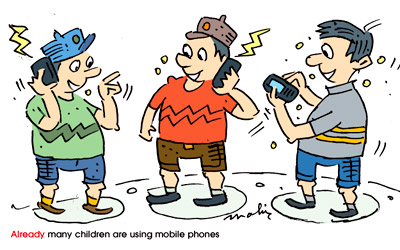|

by R. S. Karunaratne
Use 'already' meaningfully
'Already' refers to things that have happened or will have happened
at a given point in time. Very often, it is contrary to expectations.
The word is usually used in mid or end position. In spoken English
'already' is used frequently in end position.
 There
are about five musicians here already. There
are about five musicians here already.
I wonder whether the director has signed the letter already.
The board of directors has already decided to recruit a Liaison
Officer.
Already many children are using mobile phones.
The chairman had already signed my appointment letter when I went to
collect it.
If something is already happening or already true, it began to happen
or be true before now.
Nethmi is only three and she is already reading and writing.
A: Should I tell mother?
B: She already knows.
The play has already started.
'Already' usually comes before the main verb, or between an auxiliary
or modal verb.
The principal already knows about it.
Activity
Correct the wrong use of already in the following sentences. Check
your answers with the key.
1. Next week Sam is going back to Japan.
He booked the tickets already.
2. Most of the students are tired already when they return home.
3. My parents had already two children and they didn't want any more.
4. The protest rally is not over already.
5. The new bookshop has not been opened already.

**********
[Key]
1. Next week Sam is going back to Japan. He has booked the tickets
already.
2. Most of the students are already tired when they return home.
3. My parents already had two children and they didn't want any more.
4. The protest rally is not over yet.
5. The new bookshop has not been opened yet.
**********
Current
English usage
The usage of all living languages is constantly changing. English is
no exception. Therefore, be in touch with modern usage.
1. emotional and emotive
Both words are connected with the noun 'emotion'. Emotional means
'referring to emotion' as in Kamala has emotional problems. We bade him
an emotional farewell. Emotive means 'causing emotion'. Child abuse is
an emotive subject. The word 'mother' has an emotive meaning.
2. empathy and sympathy
Empathy means 'the ability to imagine and share another's feelings.'
As a disabled soldier he has an empathy with others who are wounded in
the war. Sympathy means 'a feeling of compassion, pity or sorrow towards
somebody.' We very often feel sympathy for blind people.
3. encyclopaedia and encyclopedia
In modern British English both are acceptable spellings. The former
is the traditional spelling in British English while the latter is the
traditional spelling in American English. Encyclopedia is more common in
modern English than encyclopaedia.
4. endemic
The word means 'occurring in a particular area'. In the past malaria
was endemic to the dry zone.
5. enervate
The word means 'to weaken.'
The workers were enervated by the hot climate.
6. enormity and enormousness
Enormity mean 'outrageousness or wickedness.' Everybody was shocked
by the enormity of the dictator's crimes. Enormousness means 'the
quality of being enormous or extremely large.'
The children were scared by the enormousness of the blue whale.
7. enquiry and inquiry
Although both words mean the same some English speakers see a
distinction between the two words. They use enquiry for ordinary
requests for information and inquiry for investigation.
The police are making inquiries.
8. enrol and enroll
Enrol means 'to become a member of a class or society. However, in
American English enrol is spelt enroll. The noun in British English is
enrolment. The past tense is enrolled and the present participle is
enrolling.
9. enthral
Enthral means 'to capture the attention of'.
Her acting will enthral the critics.
The past tense is enthralled and the present participle is
enthralling.
[Starters ]
Personal pronouns as subjects and objects
A personal pronoun can be used as the subject or the object of a
sentence. The object means the person or thing that the subject does
something to. When a pronoun is used as the subject of a sentence, it
must be in the subjective form. When a pronoun is used as the object of
a sentence it must be in the objective form.
 Pronouns
used in the subjective forms. Pronouns
used in the subjective forms.
I am a student at Rahula Vidyalaya.
We come to school on foot.
You are my English teacher.
He learns English with absorbing interest.
She wants to be a journalist.
It wags its tail.
They are my friends.
Use of 'and' with 'I'
You and I are classmates.
Never say: I and you.
Nimal and I have fountain pens.
Never say: I and Nimal.
Rule: Put yourself last.
Use of 'and' with 'me'.
Betsy invited you and me to her birthday party.
Nisansala waved to Sam and me.
Never say; 'me and you' or 'me and Sam'.
Rule: Put yourself last.
Pronouns used in the objective form.
Kamala gave me a mango.
She treated us well.
I have seen you somewhere.
Give him something to eat.
The chief guest gave her a certificate.
Father brought a puppy home and gave it to me.
I play with them during the interval.
Activity
Underline the correct personal pronoun and check your answers with
the key.
1. Nirmala telephoned I/me yesterday.
2. I lost my pen in the class. It/He was new.
3. Lucky, my friend, wants to speak to him/you.
4. Tamara will join we/us at Kegalle.
5. He is teaching they/them mathematics.
6. Janitha saw he/him at the carnival.
7. Please help I/me to do this sum.
8. John bought a parrot and gave it/him to me.
9. We visit our grandmother once a month. She/Her is in her eighties.
10. Jane sent I/me a birthday gift.
11. Larry and me/I want to learn French.
12. She showed me/I a secret door.
13. The teacher is ill. She/they needs a doctor.
14. Kamal and I/me are friends.
15. Please take I/me with you.
************
[Key]
1. me, 2. It, 3. you, 4. us, 5. them, 6. him, 7. me, 8. it, 9. She,
10. me, 11. I, 12. me, 13. She, 14. I, 15. me.
************
|

